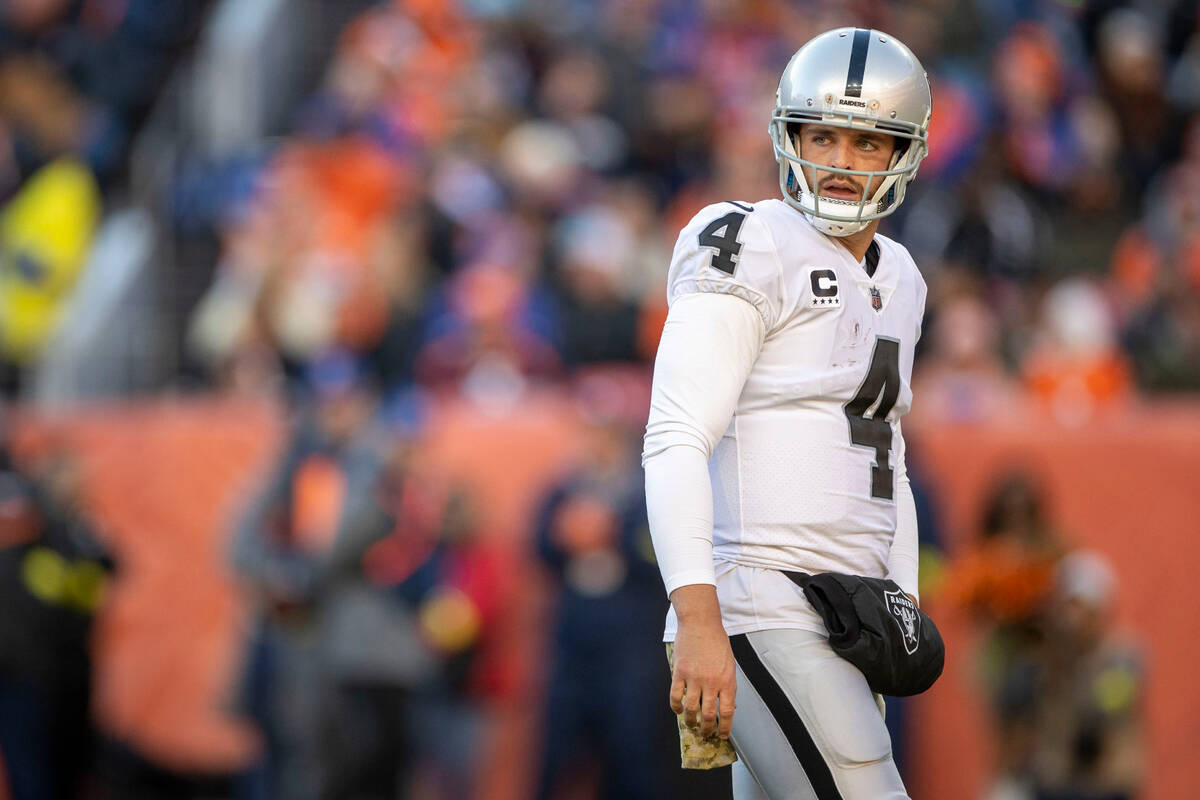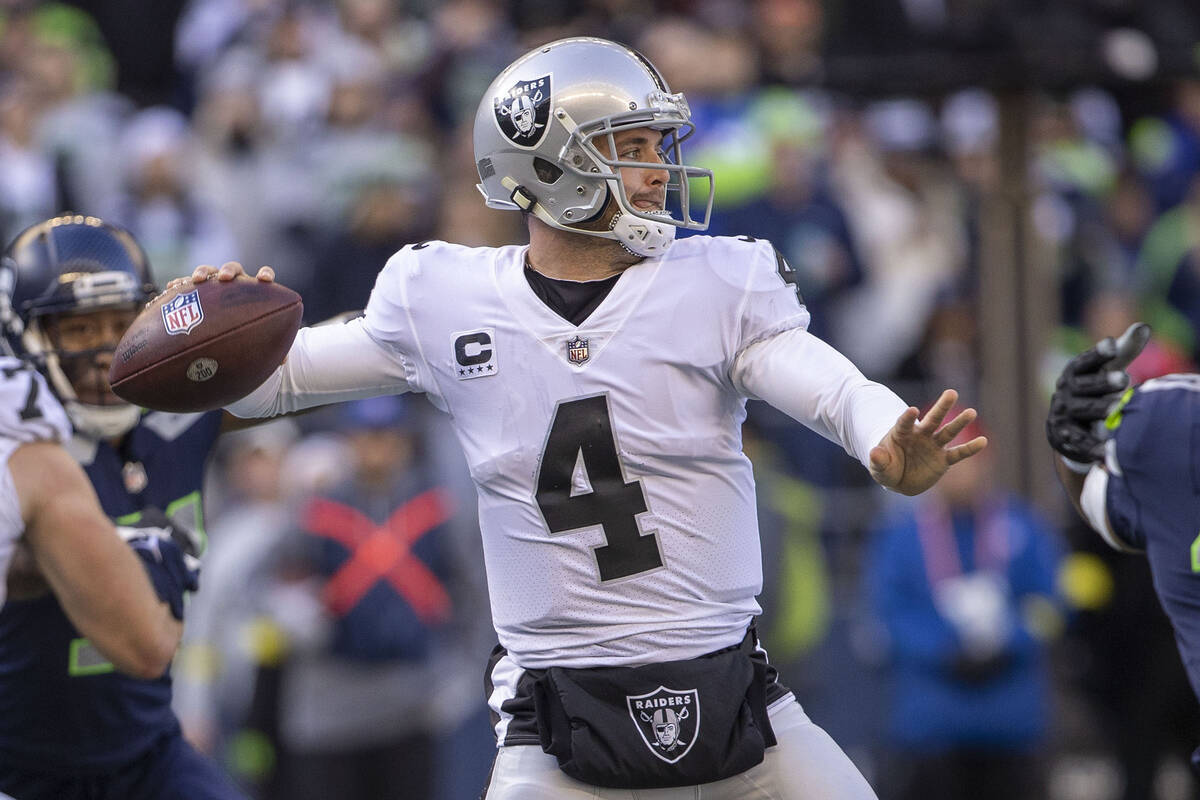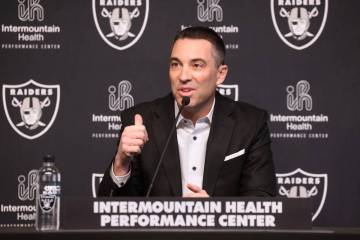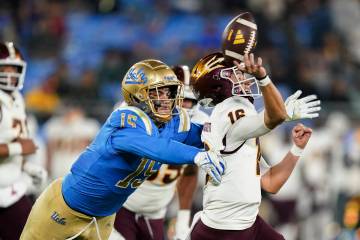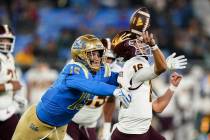Raiders’ dilemma: What if Derek Carr is seriously injured in Pro Bowl?
Raiders fans will get a chance to say goodbye to Derek Carr after all.
The Raiders’ veteran quarterback has been added to the Pro Bowl Games, which will be played Sunday at Allegiant Stadium, as a replacement for Bengals QB Joe Burrow.
😂😂😂😂
Well... maybe this invitation got lost in the mail from past seasons but I'm going back to pro bowl #4. See you soon Vegas!— Derek Carr (@derekcarrqb) January 31, 2023
It’s a rather surprising turn of events after Carr was benched for the final two games of the season, essentially signaling that end of his nine-year career with the franchise.
Carr, who turns 32 on March 28, even penned a heartfelt goodbye to Raiders fans shortly after season ended, only to find out Tuesday that he will represent the team one final time before being traded or released.
The addition of Carr, who will be making his fourth Pro Bowl appearance, raises an interesting contract question that could determine how long he remains with the team.
According to the NFL’s collective bargaining agreement, any player who is seriously injured during the Pro Bowl and can’t play the following season is guaranteed his salary. If that happened to Carr, the Raiders would owe him $40.5 million.
The concern of an injury was part of the reason the Raiders benched Carr. Could they risk a similar situation this weekend? Or would they consider releasing him before then?
Here’s a look at where things stand.
The deadline
If Carr is on the Raiders’ roster Feb. 15, a $40.5 million roster bonus becomes guaranteed. The total represents his 2023 salary of $33 million and $7.5 million of his 2024 salary.
To avoid paying the $40.5 million, the Raiders must cut Carr before the deadline or agree in principle to a trade, which would require him to waive his no-trade clause. In the trade scenario, the other team assumes his three-year, $121 million contract, including the roster guarantee.
While the trade option is the most ideal for both sides — it means Carr’s contract remains intact and the Raiders get compensation for him — there is some risk for the team. By NFL rules, no trade can be officially consummated until the start of the league’s new year March 15. That means if the other team backs out of the trade, the Raiders would be stuck with Carr and his $40.5 million guarantee.
To protect themselves, the Raiders will insist that if a trade is struck, Carr must agree to push the roster deadline past the start of the new league year. So, if the trading team backed out, the Raiders could release Carr before the new deadline without penalty.
So what is the latest?
The Raiders haven’t given Carr permission to talk with other teams about a trade, according to a person with knowledge of the situation.
Why is that?
The Raiders want to control the process as much as possible, primarily as protection against another team essentially talking to Carr about possible contracts and planning as if he would go there absent a trade.
In other words, the two sides coming to a mutual agreement but shelving things until after the Raiders are forced to release Carr. They would be shut out of any compensation as a result.
By not granting Carr permission to work out a deal, the Raiders are telling other organizations that they can’t talk to him without committing tampering.
From the Raiders’ perspective, Carr already has the final call because of his no-trade clause. Should the Raiders reach an agreement on a deal, he can approve or nix it. Short of that, they want to control all other elements of the process.
From Carr’s perspective, it makes sense that he would want leeway to find his next landing spot, especially if it enhances the chances of keeping intact his current deal. The risk he faces as a free agent is getting less money.
Carr also wants enough time to create a comfort level with his next team. Call it doing his due diligence, but it behooves him to learn as much as possible about the team before signing off.
The worry from Carr’s perspective is the Raiders agree to a deal Feb. 14, giving him just one day to gather enough information on the team. One way to alleviate that would be to extend the roster deadline to give Carr more time to make his decision.
If he then decides to veto the deal, the Raiders can release him. If he approves the deal, the extension gets pushed again to bridge the remaining time until the new league year starts.
What’s next?
As the coaching vacancies get filled around the league — from head coaches to offensive coordinators — more interest is expected to pick up on Carr. One impediment, however, is the lack of urgency from other teams to give up compensation in a trade when they can wait until he hits the open market.
The bottom line is, an already complicated situation is being stressed by a looming deadline. At this point, it wouldn’t be a shock to anyone if the Raiders and Carr simply parted ways before Feb. 15.
Contact Vincent Bonsignore at vbonsignore@reviewjournal.com. Follow @VinnyBonsignore on Twitter.
Related
— What are Raiders' options with Derek Carr?
— Raiders' top priority: Sign Tom Brady to replace Derek Carr
— Which teams would be interested in trading for Derek Carr?



